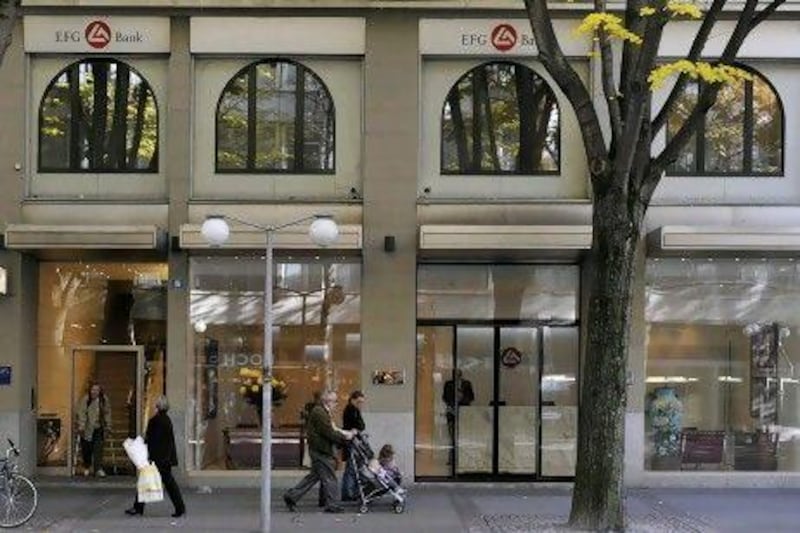A Swiss bank has become the latest international lender to withdraw from the region as financial companies trim costs in expectation of tougher times ahead.
EFG International,based in Zurich, said it would close its Dubai and Abu Dhabi offices as part of a worldwide cost-cutting effort, ending its presence in the Middle East.
Despite earlier projections that it would be able to benefit from growing Gulf wealth as oil prices and economic growth soared, EFG International found fewer opportunities than it had hoped for, said a spokesman for the bank.
"While business was being generated, it wasn't on a level of profitability and a rate of growth to justify having local offices," he said.
Global banks and wealth managers lined up to tap the UAE's growth, spurred by the opening of the Dubai International Financial Centre (DIFC) in 2004. Private banks such as Credit Suisse and JPMorgan Private Bank have courted Middle Eastern clients in an effort to shore up declining profits elsewhere in their business, while Barclays Wealth has reshuffled its management and made new appointments to target ultra-wealthy customers.
The UAE does not lack the funds to invest, with average wealth per adult having doubled to $115,774 (Dh425,261) from 2000, according to Credit Suisse research.
But that level of wealth is almost a third less than the peak in 2007, before the financial crisis hit home.
Growing competition from local players, such as Emirates NBD Private Bank and Abu Dhabi's Falcon Private Bank,has also left slim pickings for international wealth managers.
EFG International announced the closures as part of a global cost-cutting effort which will see it lay off up to 15 per cent of its 2,500 staff and close its Swedish operations.
"We have drawn a line under past mistakes and are resetting the business, improving cost-effectiveness and positioning it for future growth based on what we do best: private banking," said John Williamson, the bank's chief executive.
The bank had established operations in the DIFC in 2006, which it followed with an Abu Dhabi office in 2009.
But banks are scaling back their presence in the region as local markets grind to a halt.
Credit Suisse and Nomura have reduced numbers of equity analysts, while HSBC has shut its local brokerage. Deutsche Bank has also relocated its equity capital markets head from Dubai back to London.
The banks blame withered trading activity on the UAE's stock markets and filleted asset prices. During the third quarter of this year, the value of stocks traded on the Dubai Financial Market was 5.5 per cent of the same period in 2008.
Credit Agricole CIB has shut its mergers and advisory unit based in Dubai, Reuters reported last month.
Across the Middle East, the number of successful mergers and acquisitions during the first nine months of this year fell to 229 from 251 in the same period last year, according to data from Thomson Reuters. Deal values totalled $7.2 billion, 43.5 per cent lower than the same period a year earlier.
Private banks were finding great difficulty in meeting the cultural sensitivities of Gulf customers, leading to fierce competition for bankers with local knowledge, said Christo Daniels, the managing director of Morgan McKinley.
"It's about the Arabic-speaking relationships rather than the brand on the business card," he said.
"People with access to local networks are in short supply and that's very hard to break into as an expat," Mr Daniels added. "There's a war for talent in that area, because they know that the success or otherwise of their business is dependent on that relationship."
A reduction in staff numbers among international banks was not being mirrored among local banks, which were better able to tap this business because of time spent in the region, Mr Daniels added.





